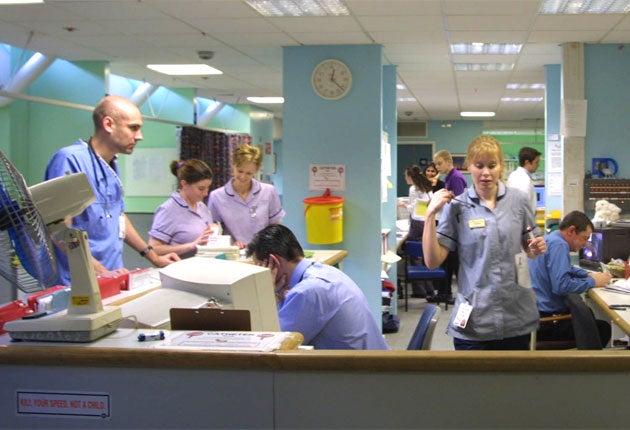One doctor for every 400 patients: alarm raised at night cover in hospitals

Some doctors are responsible for looking after up to 400 patients in hospital at night, a study has found.
A review of clinical teams in hospitals in England and Wales has revealed wide variations in the level of night time cover since trainee doctors were limited to a working week of 48 hours last August, under the European Working Time Directive (EWTD).
The Royal College of Surgeons said there was now "overwhelming evidence that safe and effective hospital cover, especially at night, cannot be sustained" under the new European rules.
The Royal College of Physicians (RCP), which carried out the survey, said it raised "serious concerns".
On average, the survey found doctors were responsible for 61 patients, but the range was from one to 400. Almost one in 10 teams reported that the most senior member on duty in charge of a ward was a junior doctor in their first two years of training. Only 6 per cent of teams included a consultant on duty at night.
The survey also revealed a rise in sickness absence rates which the College said "possibly reflected a loss of team working and sense of belonging" among newly qualified doctors a year into their training. Dr Andrew Goddard, director of the RCP's medical workforce unit, said: "The very low number of doctors per patient at night in some hospitals raises serious concerns for patient safety and there are also worrying reports of very junior doctors being left unsupported, which urgently require further investigation.
"In the daytime, care for many patients is carried out by junior doctors, which limits their time shadowing more senior doctors and improving their knowledge and skills."
Dr Goddard added: "The 48-hour week was brought in to improve the wellbeing of doctors, and by extension prevent mistakes in patient care. Far from benefiting their welfare, the poor implementation of the directive means that juniors are missing out on crucial support and valuable training opportunities, and patient care is being spread too thinly."
The study was based on responses from consultants who were asked to record the number of patients for which their team was responsible at 11am and 11pm on a specific date last November, in order to create a snapshot of staffing levels. Data was provided by 887 teams at 11am and 670 at 11pm. The findings are to be published later in the year in the journal Clinical Medicine.
John Black, president of the Royal College of Surgeons, backed the findings. "We have overwhelming evidence from the front line that safe and effective hospital cover, especially at night, cannot be sustained under EWTD," he said. "You only have to look at the situation at Mid Staffordshire Trust, which was heavily criticised in an independent report earlier this year, to know that one trainee covering all surgical wards at night is a disaster waiting to happen.
"This new evidence from the RCP corroborates what surgical trainees have been telling us for months. Under EWTD, rotas are unworkable to the point of being dangerous, and junior doctors without adequate supervision are being asked to make critical decisions beyond their competence."
A Department of Health spokesman said: "Employers are responsible to ensure that service rotas are designed and staffed appropriately, in accordance with the working time regulations. The Department of Health's overriding priority will continue to be ensuring that patients are safe; and experience, high quality and effective care in the NHS."
Join our commenting forum
Join thought-provoking conversations, follow other Independent readers and see their replies
Comments
Bookmark popover
Removed from bookmarks